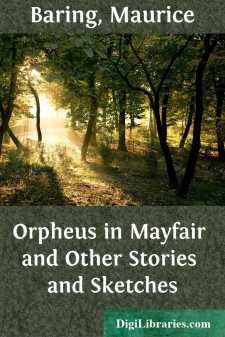Categories
- Antiques & Collectibles 13
- Architecture 36
- Art 48
- Bibles 22
- Biography & Autobiography 813
- Body, Mind & Spirit 142
- Business & Economics 28
- Children's Books 14
- Children's Fiction 11
- Computers 4
- Cooking 94
- Crafts & Hobbies 4
- Drama 346
- Education 46
- Family & Relationships 57
- Fiction 11828
- Games 19
- Gardening 17
- Health & Fitness 34
- History 1377
- House & Home 1
- Humor 147
- Juvenile Fiction 1873
- Juvenile Nonfiction 202
- Language Arts & Disciplines 88
- Law 16
- Literary Collections 686
- Literary Criticism 179
- Mathematics 13
- Medical 41
- Music 40
- Nature 179
- Non-Classifiable 1768
- Performing Arts 7
- Periodicals 1453
- Philosophy 64
- Photography 2
- Poetry 896
- Political Science 203
- Psychology 42
- Reference 154
- Religion 513
- Science 126
- Self-Help 84
- Social Science 81
- Sports & Recreation 34
- Study Aids 3
- Technology & Engineering 59
- Transportation 23
- Travel 463
- True Crime 29
Orpheus in Mayfair and Other Stories and Sketches
by: Maurice Baring
Categories:
Description:
Excerpt
ORPHEUS IN MAYFAIR
Heraclius Themistocles Margaritis was a professional musician. He was a singer and a composer of songs; he wrote poetry in Romaic, and composed tunes to suit rhymes. But it was not thus that he earned his daily bread, and he was poor, very poor. To earn his livelihood he gave lessons, music lessons during the day, and in the evening lessons in Greek, ancient and modern, to such people (and these were rare) who wished to learn these languages. He was a young man, only twenty-four, and he had married, before he came of age, an Italian girl called Tina. They had come to England in order to make their fortune. They lived in apartments in the Hereford Road, Bayswater.
They had two children, a little girl and a little boy; they were very much in love with each other, as happy as birds, and as poor as church mice. For Heraclius Themistocles got but few pupils, and although he had sung in public at one or two concerts, and had not been received unfavourably, he failed to obtain engagements to sing in private houses, which was his ambition. He hoped by this means to become well known, and then to be able to give recitals of his own where he would reveal to the world those tunes in which he knew the spirit of Hellas breathed. The whole desire of his life was to bring back and to give to the world the forgotten but undying Song of Greece. In spite of this, the modest advertisement which was to be found at concert agencies announcing that Mr. Heraclius Themistocles Margaritis was willing to attend evening parties and to give an exhibition of Greek music, ancient and modern, had as yet met with no response. After he had been a year in England the only steps towards making a fortune were two public performances at charity matinees, one or two pupils in pianoforte playing, and an occasional but rare engagement for stray pupils at a school of modern languages.
It was in the middle of the second summer after his arrival that an incident occurred which proved to be the turning point of his career. A London hostess was giving a party in honour of a foreign Personage. It had been intimated that some kind of music would be expected. The hostess had neither the means nor the desire to secure for her entertainment stars of the first magnitude, but she gathered together some lesser lights—a violinist, a pianist, and a singer of French drawing-room melodies. On the morning of the day on which her concert was to be given, the hostess received a telegram from the singer of French drawing-room melodies to say that she had got a bad cold, and could not possibly sing that night. The hostess was in despair, but a musical friend of hers came to the rescue, and promised to obtain for her an excellent substitute, a man who sang Greek songs.
When Margaritis received the telegram from Arkwright's Agency that he was to sing that night at A—— House, he was overjoyed, and could scarcely believe his eyes. He at once communicated the news to Tina, and they spent hours in discussing what songs he should sing, who the good fairy could have been who recommended him, and in building castles in the air with regard to the result of this engagement....




